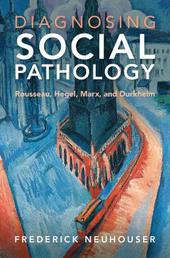
|
Diagnosing Social Pathology: Rousseau, Hegel, Marx, and Durkheim
Hardback
Main Details
| Title |
Diagnosing Social Pathology: Rousseau, Hegel, Marx, and Durkheim
|
| Authors and Contributors |
By (author) Frederick Neuhouser
|
| Physical Properties |
| Format:Hardback | | Pages:386 | | Dimensions(mm): Height 235,Width 159 |
|
| Category/Genre | Social and political philosophy |
|---|
| ISBN/Barcode |
9781009235037
|
| Classifications | Dewey:361.001 |
|---|
| Audience | |
|---|
| Illustrations |
Worked examples or Exercises; Worked examples or Exercises
|
|
Publishing Details |
| Publisher |
Cambridge University Press
|
| Imprint |
Cambridge University Press
|
| Publication Date |
27 October 2022 |
| Publication Country |
United Kingdom
|
Description
Can a human society suffer from illness like a living thing? And if so, how does such a malaise manifest itself? In this thought-provoking book, Fred Neuhouser explains and defends the idea of social pathology, demonstrating what it means to describe societies as 'ill', or 'sick', and why we are so often drawn to conceiving of social problems as ailments or maladies. He shows how Rousseau, Hegel, Marx, and Durkheim - four key philosophers who are seldom taken to constitute a 'tradition' - deploy the idea of social pathology in comparable ways, and then explores the connections between societal illnesses and the phenomena those thinkers made famous: alienation, anomie, ideology, and social dysfunction. His book is a rich and compelling illumination of both the idea of social disease and the importance it has had, and continues to have, for philosophical views of society.
Author Biography
Frederick Neuhouser is Professor of Philosophy at Barnard College, Columbia University, and Permanent Fellow at the Center for Humanities and Social Change in Berlin. His books include Fichte's Theory of Subjectivity (Cambridge, 1990), Foundations of Hegel's Social Theory (2000), Rousseau's Theodicy of Self-Love (2008), and Rousseau's Critique of Inequality (Cambridge, 2014).
Reviews'The concept of 'social pathology' seems to be both indispensable to critical social theory and at the same time fraught with problems, as it may invoke illegitimately organicist, conservative conceptions of society. In this path-breaking new book, Frederick Neuhouser, with characteristic philosophical depth and rigor, provides the most potent analysis and defense of the legitimacy of the concept in social theory yet to have appeared.' Arash Abazari, Sharif University of Technology 'Neuhouser's achievement in Diagnosing Social Pathology is an exceedingly rare one: it is at once a highly erudite examination of the ontological commitments underlying social theories of Hegel, Durkheim, and Marx (among others) that will be quite rewarding for anyone with a scholarly interest in those figures, while at the same time laying the groundwork for a thoroughly compelling and original method of social critique. This is a deeply fascinating work that will change the way its readers think about the possible modalities of social critique.' Todd Hedrick, Michigan State University
|